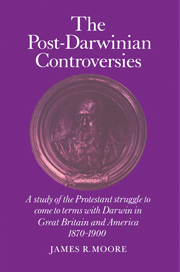 The Post-Darwinian Controversies
The Post-Darwinian Controversies Book contents
- Frontmatter
- Contents
- Dedication
- Preface
- PREFACE TO THE PAPERBACK IMPRESSION
- Introduction: the terrain of revision
- PART I HISTORIANS AND HISTORIOGRAPHY
- PART II DARWINISM AND EVOLUTIONARY THOUGHT
- PART III THEOLOGY AND EVOLUTION
- Conclusion: on coming to terms with Darwin
- Dedication
- Notes to the text
- Bibliography
- Index
PREFACE TO THE PAPERBACK IMPRESSION
Published online by Cambridge University Press: 22 January 2010
- Frontmatter
- Contents
- Dedication
- Preface
- PREFACE TO THE PAPERBACK IMPRESSION
- Introduction: the terrain of revision
- PART I HISTORIANS AND HISTORIOGRAPHY
- PART II DARWINISM AND EVOLUTIONARY THOUGHT
- PART III THEOLOGY AND EVOLUTION
- Conclusion: on coming to terms with Darwin
- Dedication
- Notes to the text
- Bibliography
- Index
Summary
The call for a new and more accessible impression has afforded the opportunity to correct several errors and minor misprints and to make a very few stylistic changes in the text. Purchasers of the first edition may be interested to know that the present volume, apart from the enlarged bibliographic addendum, is substantially identical with the one they possess.
This is not of course to imply that I could now write the same book, or that I am fully satisfied with it as it stands. My remarks about ‘prejudice’ in the original Preface have only to be reaffirmed. Both in its treatment of the post- Darwinian controversies, by reference to individual psychology, as a ‘non-violent’ episode of intellectual history, and in its conclusions, which have been taken too readily as apologetic, the book is an artifact of my concerns and preconceptions in the early 1970s. More recently I have been struggling to anchor the conclusions in their historic social contexts for reasons crucially (though not completely) dissimilar to those which had actuated me at the start. Were the book being re-written, I would acknowledge a greater debt to Frank Turner and Bob Young (see pp. 13, 366 below) through a revised estimate of social Darwinism and a new emphasis on the military metaphor as mediating a genuine conflict between the theodicies of competing social elites.
Still I offer the new impression without hesitation, not least because of encouragement from generous and incisive reviewers such as Dick Aulie, David Hollinger, Ron Numbers, Roger Smith, and Frank Turner.
- Type
- Chapter
- Information
- The Post-Darwinian ControversiesA Study of the Protestant Struggle to Come to Terms with Darwin in Great Britain and America, 1870-1900, pp. xiiPublisher: Cambridge University PressPrint publication year: 1979


